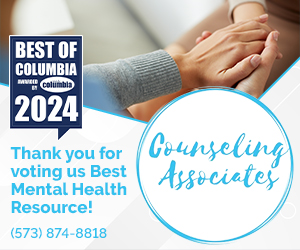Photos by L.G. Patterson
Did you know that 33% of adults are at risk for kidney disease? And in the U.S. alone, more than 90,000 people are on waiting lists to receive a kidney. Meet two Columbia individuals: one who is critically seeking a kidney match and another who donated a kidney for her partner.
Zachary Arnold Hopes For A New Kidney
A friendly mutt and four kids are playing in the front yard.
Zachary Arnold opens the screen door, shoos the dog and tells his kids that he’s going to be inside talking to the visitor for a while. Arnold is a stocky guy with a solid handshake. His voice is friendly and strong. His attitude is positive, and he looks like what he is: a 35-year-old father who is busy looking after his four kids after school. Except there’s a lot more to Arnold that isn’t obvious. Most days he spends three-and-a half to four hours in his bedroom, hooked up to his home dialysis machine. His wife, Eliza, and he have been trained to insert the needles in his arm and to monitor the live-saving machine, which does what his kidneys can’t — filters his blood, removing waste. Arnold has zero kidney function, which means that dialysis isn’t a choice: It’s an absolute necessity.
The home dialysis machine and his family’s support keep him going and keep him hoping that it won’t be much longer before a donor kidney becomes available. Until he gets a transplant, he will be tied to the machine, and, at best, his future will be on hold. Arnold tries not to think about a worst-case scenario, which could involve infections or other organs failing. But with just one call, his hopes for a healthy future could be realized. Arnold has been wait- ing for that call since August 2020. “My transplant team could call at 2 a.m. and say they have a donor, and it’s time to come in,” he says. “When I first started dialysis, I’d get excited when the phone rang, but now I use reverse psychology, telling myself ‘this isn’t it.’ When the time comes, it’ll happen,” he says.
Not just any kidney from any donor will work for Arnold or anyone else needing a transplant. Complex blood tests of potential donors and recipients have to match, showing a high degree of compatibility. Perfect matches are rare, and weaker matches could lead to rejection of the new kidney. This is Arnold’s second time around the transplant block. He was 19 years old and leading an active life, wrestling and looking forward to college, when both his kidneys started failing. Until that point, the only health problem he had was high blood pressure, which was controlled with medicine. When kidneys lose most of their ability to function, dialysis begins and usually can’t stop until a kidney transplant. Arnold was put on a waiting list, started dialysis, and about four years later he got the call that a matched kidney was available. After recovering from the transplant operation, he resumed his life. “It was great, and I was free again. I could travel and do what I wanted,” he says.
But he knew that it was only a matter of time before the transplanted kidney failed. Although transplants from a live donor can last 20 or more years, Arnold’s transplant came from a deceased donor, and those transplants typically don’t last as long. Arnold did what he could with the time and health the new kidney gave him — he went about living his life, trying to stay healthy. He coached wrestling and worked as a welder, frequently traveling for oil and natural gas companies that employed him. But about two years ago, Arnold noticed that he was getting tired more quickly, that he was gaining weight and that his face, ankles and hands were puffy. He was disappointed but not too surprised when a doctor gave him got the news that the transplanted kidney was failing. “The doctors told me they were glad I got more than 10 years out of it. Over that time, I had forgotten what it was to be on dialysis,” he says.
Arnold fell back into the familiar routine, spending hours most days tethered to the dialysis machine. It’s not just that dialysis takes so much time out of his day, but, “Sometimes I get too tired or sick to go to the kids’ activities,” Arnold says. All four of his children — two boys and two girls ages 6 to 10 — are wrestlers. “And I enjoy taking them to practice or tournaments,” he says. Recently, he and the family got back home from a tournament late at night. “Lawton, my 9-year-old, stayed with me during the treatment. I have to have somebody with me the whole time in case there’s an emergency, and my wife had to look after the other three kids,” he says.

Arnold works hard to keep his illness from defining his or his family members’ lives. “I’ve got much bigger things to think about than just being sick — like my kids being successful in school and their sports. I try not to let my health problems affect my family. I don’t think my kids understand that death is a possibility for not doing my treatments. As far as my kids know, Daddy just needs this to feel better.”
Wrestling is a big part of the family’s life. Arnold’s kids are the family’s third generation of wrestlers. “My uncle was a wrestler and both my brothers wrestle,” Arnold says. One brother is the wrestling coach at De Smet High School in St. Louis, and his younger brother, J’den Cox, is the famous two-time world champion. The entire family is helping raise awareness about the need for kidney donors. “J’den has been helping with a podcast and videos,” he says. “The message is that lots of people need kidney transplants. It’s not about me. I’m a platform for getting the message out. “
Family, friends and wrestling contacts have stepped up as potential donors. About 100 people have taken the first step and checked out whether they were eligible to donate a kidney to Arnold. Of these, 50 met the health guidelines for donating but none were a good enough match.
But Arnold can hope. “Two weeks ago, I got a call that a kidney came up that was pretty close to matching me. I was fifth in line. But it turned out to be a better match for one of the four people in front of me. Because of my previous transplant and my antibodies, I can basically receive a kidney from only 5% of the population,” he says.
Laurie Hines’ Donation Gave A New Life To Her Life Partner
Arnold has never met Laurie Hines, a fellow Columbian, but Hines knows exactly what he’s going through. Hines, who is in her 60s, has only one kidney. She was born with two, but donated one exactly six years ago so that her life partner, Ted Glasgow, would get the transplanted live kidney he desperately needed. Although Hines and Glasgow were not a match, they took part in a “paired kidney exchange,” where kidneys are exchanged between two incompatible pairs. It’s a sort of swap. Basically, it allows an incompatible donor, such as Hines, to donate a kidney on behalf of someone else. Through this type of donation, Glasgow received a live kidney from a donor in New York; Hines’ kidney was transplanted into a person in Minnesota.
For the past five years, Hines has been the executive director of the Missouri Kidney Program, a state-funded program administered by the University of Missouri School of Medicine. “When Ted first got sick, I knew nothing about donations, other than the romanticized version we see on social media of people being heroes, and, of course, I knew a bit about deceased donations,” Hines says.
Glasgow, who worked as a physical therapy aide at Boone Health, was in such good physical condition that he was winning bodybuilding contests in his spare time. Because of his exceptional strength, he was often assigned the largest, most difficult patients to help. He had no idea he had kidney problems until he found himself in the intensive care unit. “Ted got sick with no lead up of symptoms, which is pretty typical of people crashing into end-stage kidney disease,” Hines says.
He was diagnosed with a kidney disease prevalent among African Americans, FSGF. “We tried for a year to keep him from ending up on dialysis,” she says. “In-center dialysis is a life-saving treatment, but it’s a brutal treatment, and the odds of surviving five years on dialysis are less than 50/50.” For the two years that Glasgow was on dialysis, Hines would keep him company at the center for about an hour each session until Ted would get groggy and drift off to sleep. Like Arnold, they were in limbo, waiting for a donor kidney. “Quite a few people got teed-up and tested for Ted, but nobody made it through the medical evaluation — except for me,” Hines says.
That was good enough. Ted spent his last day on dialysis on March 14, 2016. “On March 15, we both went into surgery at Barnes,” Hines says. “They wheeled me in first and took my kidney. Then they woke me up — which was lovely — and I got to watch Ted’s new kidney arrive by helicopter from the airport.”
Less than three days later, they were back at home in Columbia with their relatives helping them through their convalescence. Hines had been skeptical when her surgeon said she’d only have a bit of discomfort, but “he was absolutely right,” she says. “I had a very small incision and they pulled my kidney out.” Since then, she has enjoyed good health and doesn’t feel any negative effects from having donated her kidney.

Glasgow recovered and is now able to continue working out most days. He’s retired but experiencing some health problems post-transplant. His kidney, though, is doing what it should, thriving in its new host, allowing him to stay off dialysis. Overall, the couple’s experience has not only improved Glasgow’s life but has also given Hines an exceptional perspective on the problems of both donors and transplant recipients, a perspective that assists her work for the Missouri Kidney Program. “Being a living donor and a caregiver, I can use my personal experience as a groundwork for people in a way that almost nobody else can,” she says.
The program she directs supports research and education of patients and health care providers, partnering with dialysis and transplant centers statewide. Its wide range of services include direct financial aid to help qualified patients travel to and from dialysis or transplant centers, as well as indirect financial aid that covers health insurance premiums for transplant patients and that makes it possible for low-income clients to continue on Medicaid. To reduce the costs of the drugs that patients must have, the Missouri Kidney Program set up a centralized drug program managed by Kilgore’s Medical Pharmacy that distributes medicines statewide at a reduced price. Hines also wrote and now distributes the My Transplant-Ready Workbook. “We have the only such workbook in the country that helps patients who are ready for a transplant but could use some help working through the process,” Hines says.
Hines isn’t content to wait until patients need her program, when their only options are dialysis or a transplant. “I want to move the program upstream, to stop people from going to end-stage renal disease. “Ted should not have crashed with a diagnosis we never expected, but that’s pretty classic,” she says.
While patients and their families struggle with the consequences of kidney disease, they can find hope in one fact, according to Hines. Missouri has one of the nation’s most successful organ donation registries. Of the state’s 6 million people, a bit more than 4 million have checked the box on their drivers’ licenses to donate their organs at the time of their deaths.
That one simple decision means the world to anyone needing a kidney. As Arnold says, “Why not donate? You can’t take it with you.”
What You Need to Know about Kidney Disease and Transplants
- Kidneys are fist-sized organs that remove the body’s waste and regulate various hormones.
- 33% of adults are at risk for kidney disease
- About 37 million adults in the United States have chronic kidney disease. Most are undiagnosed.
- Diabetes and high blood pressure are responsible for 2/3 of chronic kidney disease cases.
- African Americans, Hispanic Americans, Asians, Pacific Islanders and Native Americans are at high risk for kidney disease, with African Americans being four times as likely to develop kidney failure.
- Recent statistics show that in the United States 22,817 people received donated kidneys in one year. More than 90,000 people are on waiting lists to receive a kidney.
How to Donate
- Register as an organ and tissue donor at the time you renew your driver’s license or state ID. Or you can register online at donatelifeMissouri.org. When your life is over, you’ll be giving others a chance at a better life.
- If a family member or someone you care about needs a donation and you’d like to be considered for a live donation, contact the Midwest Transplant Network or the National Kidney Foundation.
- Some Good Samaritans donate a kidney and do not specify who should receive it. If that’s something you’d like to consider, the organizations mentioned above will provide support and guidance to you.




















